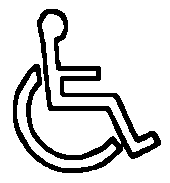INFORMATION ABOUT THE
AMERICANS WITH DISABILITIES ACT (ADA)
![]()
Congress enacted the Americans with Disabilities Act (ADA) in 1991. The ADA attempts to provide a comprehensive solution to discrimination in employment, government services and public accommodations against people with disabilities. The Department of Justice has a toll-free ADA Information Line at 800-514-0301 (voice) or 800-514-0383 (TDY). You may also obtain electronic information by computer from the ADA Electronic Bulletin Board System by calling 202-514-6193.
We hope that the questions and answers presented here will assist you in familiarizing yourself with the terms and provisions of the ADA. While the material below attempts to answer common questions in this area, nothing provided here is a substitute for the advice of competent counsel. We strongly urge you to consult with an attorney licensed to practice in your state about any particular legal problem you may have.

WHO IS PROTECTED BY THE AMERICANS WITH DISABILITIES ACT?
![]() The
Act covers people with both physical and emotional disabilities. For purposes
of the Act, a person is considered to "be disabled" or to "have
a disability" if he or she:
The
Act covers people with both physical and emotional disabilities. For purposes
of the Act, a person is considered to "be disabled" or to "have
a disability" if he or she:
· has a physical or mental impairment that substantially limits one or more of his or her major life activities
· has a record of such an impairment or
· is regarded as having such an impairment.
For example, persons with an amputated leg, or persons
infected with the AIDS virus or people suffering from certain  emotional illnesses are
covered by the Act.. However, some conditions, such as illness resulting from
current illegal drug use are expressly excluded from the Act's protection.
emotional illnesses are
covered by the Act.. However, some conditions, such as illness resulting from
current illegal drug use are expressly excluded from the Act's protection.
This definition of "disability" is broader than many used in the past. So a person who is perceived by others to be disabled may be entitled to the ADA's protections even if he or she can objectively perform as well as a non-disabled person.
WHAT MUST MY EMPLOYER DO TO ACCOMMODATE MY DISABILITY?
![]() Under the ADA, no covered employer may discriminate in
hiring, promoting or laying off any person with a disability. The law requires
that employers make "reasonable accommodations" for their disabled
employees so as to allow them to perform their jobs efficiently and safely.
Sometimes it is hard to be sure whether or not the employer has complied with
the law. The meaning of the phrase "reasonable accommodation" is,
however, hotly debated and one of the major sources of ADA litigation.
Under the ADA, no covered employer may discriminate in
hiring, promoting or laying off any person with a disability. The law requires
that employers make "reasonable accommodations" for their disabled
employees so as to allow them to perform their jobs efficiently and safely.
Sometimes it is hard to be sure whether or not the employer has complied with
the law. The meaning of the phrase "reasonable accommodation" is,
however, hotly debated and one of the major sources of ADA litigation.
Employers are not required to
go to outrageous expense or trouble to make accommodations for a disabled
employee. The  key is whether the
requested accommodation is objectively reasonable or not. Some examples of a
"reasonable accommodation" are:
key is whether the
requested accommodation is objectively reasonable or not. Some examples of a
"reasonable accommodation" are:
· Making existing facilities readily accessible (e.g., installing a wheelchair ramp)
· Job restructuring or reassignment
· Part-time or modified work schedules
· Acquiring or modifying equipment, devices, examinations, training materials or policies
· Providing qualified readers or interpreters
· Providing assistive devices, such as teletype writers or telephone amplifiers, special computers or tactile markings on equipment
· Braille or large-print tests
WHAT HAPPENS UNDER THE ADA IF MY EMPLOYER DOES NOT ACCOMMODATE MY DISABILITY?
![]() If you are fired as a result of
your disability, file a complaint with the Federal Equal Employment
Opportunity
If you are fired as a result of
your disability, file a complaint with the Federal Equal Employment
Opportunity  Commission (EEOC) within
180 days of your discharge. The EEOC will investigate your claim and attempt to
resolve it. If the EEOC does not resolve the matter within 180 days, it will
give you a "right to sue" letter so that you can bring a claim in
Federal Court to get your job back and back pay.
Commission (EEOC) within
180 days of your discharge. The EEOC will investigate your claim and attempt to
resolve it. If the EEOC does not resolve the matter within 180 days, it will
give you a "right to sue" letter so that you can bring a claim in
Federal Court to get your job back and back pay.
MAY AN EMPLOYER MAKE A PROSPECTIVE EMPLOYEE SUBMIT TO A PHYSICAL?
![]() The Americans with Disabilities Act allows employers to
require perspective employees to take a physical exam, so long as the employer
requires this of all prospective employees, regardless of disability. All exams
must be treated confidentially and the files may not be disclosed to the
public.
The Americans with Disabilities Act allows employers to
require perspective employees to take a physical exam, so long as the employer
requires this of all prospective employees, regardless of disability. All exams
must be treated confidentially and the files may not be disclosed to the
public.
DOES THE ADA APPLY OUTSIDE OF THE WORKPLACE?
![]() In addition to the protection it affords disabled workers,
the ADA has provisions that deal with rights of disabled Americans when
In addition to the protection it affords disabled workers,
the ADA has provisions that deal with rights of disabled Americans when  seeking government services and
public accommodations.
seeking government services and
public accommodations.
In general, government services must be provided in a non-discriminatory manner so as to maximize the mainstreaming of disabled Americans. The issues surrounding the nature of disabilities and the accommodations which must be made are similar to those in the employment realm. For example, cities are expected to make curb cuts for wheelchairs when building new sidewalks but do not have to tear up all of the old ones.
Any covered business serving the public must be accessible. Hence, bathrooms must be handicapped-accessible and barriers to disabled people's use of the business must be either removed or lowered as much as possible, given the economic and physical realities of the particular business.
HOW CAN I FIND OUT MORE ABOUT WHICH PRACTICES AND ACTIVITIES ARE COVERED BY THE AMERICANS WITH DISABILITIES ACT?
![]() Refer to the Americans with Disabilities Act Handbook, which
is a comprehensive handbook that serves as a fundamental guide to all five
titles of the ADA. In layman's terms it explains:
Refer to the Americans with Disabilities Act Handbook, which
is a comprehensive handbook that serves as a fundamental guide to all five
titles of the ADA. In layman's terms it explains:
· disability tax-related deductions and applicable business credits;
· common types of accommodations employers are required to provide;
· how to alter establishments to accommodate people with disabilities;
· "reasonable accommodation" and "undue hardship";
· rights and responsibilities of employers and employees in the hiring process
To obtain a form to order this handbook, contact United States Government Information, Superintendent of Documents, P.O. Box 371954, Pittsburgh, PA 15250-7954.
This is just a brief summary of a very complex and far reaching law. If you or someone you know believe they have been the subject of discriminatory conduct prohibited by the ADA, a DESSEN, MOSES & ROSSITTO attorney will be happy to review the facts of the incident. Just press the button below to submit a factual history form.
If you have other questions or comments about this area or any other area in which we practice, please send us an E-mail message with your questions or comments and we will be happy to try to assist you.
![]()
LINKS TO OTHER INTERESTING INFO
ADA and
Disability Information
ADA & Handicap Accessibility Experts & Consultants
Americans with Disabilities Act (ADA)
An Overview of Employment Discrimination Law
ADA Home Page (U.S. Department of Health & Human Services)
ADA Home Page (U.S. Department of Justice)
Employee Benefit Research Institute
Job Accomodation Network (JAN)
42 U.S.C. 791 (The Rehabilitation Act)
![]()
Top of Page | DM&R Home Page
| Legal Article Wall
About DM&R | To Retain
DM&R | Ask Us A Question
![]()
Copyright © 1996 -
2006 Dessen, Moses & Rossitto
All rights reserved.



